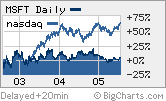 |
| I say, I say boy. Linux is just wrong. Wait for Longhorn. |
|
 |
| Going nowhere: Tech stocks have bounced back during the past three years but Microsoft hasn't participated in the rally. |
|
|
|
|
|
|
|
|
|
|
|
NEW YORK (CNN/Money) – How can you tell the difference between Lance Armstrong and Microsoft's stock? Shares of Microsoft haven't been doing a lot of climbing lately.
To shareholders, Microsoft's stock has been a bad joke the past few years, despite several positive developments at the company and in the overall technology sector.
The software giant has settled many of its outstanding antitrust cases with various companies, state governments and the federal government.
Its home entertainment division (Xbox) and MSN Internet operating unit have posted solid growth.
And about a year ago, Microsoft (Research) agreed to give back a large sum of its cash to shareholders in the form of a special one-time $3 a share payout, an increased regular dividend and stock buybacks.
Still, shares have fallen about 2.5 percent this year even as the stocks of other companies with strong exposure to the personal computer market have soared. Winners include Intel (Research), Hewlett-Packard (Research) and Apple (Research).
With Microsoft set to report fiscal fourth-quarter earnings on Thursday, investors are hoping that it will confirm what other tech companies have said so far this earnings season, namely that tech spending is on the rise.
"PC demand is more robust than it had appeared earlier. There's the double whammy with the consumer and corporations increasing spending and that should be good for Microsoft," said Vincent Muscolino, managing director with mutual fund firm D.L. Babson, which owns shares of Microsoft.
As a result, Microsoft should report fairly strong results. Analysts expect sales of $10.2 billion, a 9 percent increase from a year ago, and earnings per share, excluding the cost of restricted stock grants to employees, of 31 cents per a share, up 12 percent.
That's healthy growth for a company of Microsoft's size but it pales in comparison to the type of numbers that younger tech firms are putting up.
And therein lies Microsoft's biggest problem.
"What's happened with Microsoft is after a spectacular period of super-growth, it's done what all companies inevitably must do. It has reached maturity," said James Owers, professor of finance with the Robinson College of Business at Georgia State University.
Now, wait, I say, wait a minute
It appears that many Microsoft investors, and customers, are waiting for the much-anticipated new version of its Windows operating system, code-named Longhorn, which is scheduled to be released in late 2006.
Microsoft has promised that Longhorn will have many improvements -- better security features, more comprehensive search capabilities and a friendlier user interface, for example.
Buzz about Longhorn, and its potential boost to growth, may be the only thing that will get the stock moving again.
Microsoft, despite its diversification efforts, still gets the majority of its sales and operating profits from licenses for operating systems and related software, such as Word and Excel.
But given the expected release date, Longhorn won't have an impact on Microsoft's financial results until fiscal 2007, which begins in July 2006.
"The true catalyst for Microsoft is Longhorn and that is some time away," said Sunil Reddy, senior portfolio manager with Fifth Third Asset Management, which owns Microsoft.
Reddy added that for the near-term, investors should keep an eye on what the company says about expectations for unearned revenue, a figure also known as deferred revenue. Unearned revenue is the amount of sales Microsoft expects to receive from software license renewals in the coming quarters and is a good gauge of future sales growth.
Disappointing unearned revenue figures during the past few years have heightened concerns that customers, particularly corporations, are holding back on software upgrades until Longhorn comes out.
For Microsoft's next fiscal year, which ends in June 2006, analysts are expecting sales and earnings to increase by about 10 percent. Only a few analysts have published fiscal 2007 estimates for Microsoft and they aren't banking on much improvement from Longhorn. According to Thomson/First Call, analysts are predicting another 10 percent annual increase in sales and a 14 percent jump in profits.
The big question, though, is will this type of growth be enough to justify a much higher stock price? The stock currently trades at about 18 times fiscal 2006 earnings estimates and Reddy said it's unclear how much of a premium investors would be willing to pay for Microsoft unless there is more of an acceleration to sales and profits.
And Owers said he thinks that while Longhorn is an important release for the company, it won't change Wall Street's perception of Microsoft that much since the company already dominates the operating system market.
"Longhorn is a positive because it could forestall competition from free operating systems out there and better protection against viruses. But the reality is Microsoft doesn't have a big bundle of growth opportunities to harvest," he said.
For a look at more software stocks, click here.
For more coverage of earnings, click here.

|